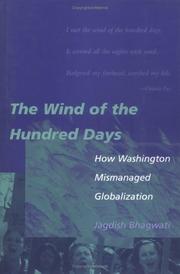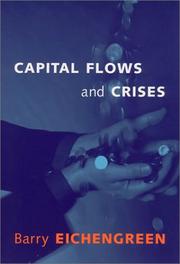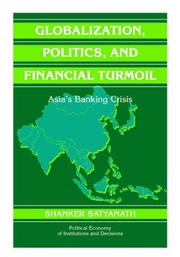| Listing 1 - 10 of 58 | << page >> |
Sort by
|
Book
ISBN: 8132112393 1281963674 9786611963675 8132100298 9788132100294 0761936718 9780761936718 8178298376 9788178298375 9780761936718 9788178298375 9352801261 9788132112396 9781281963673 6611963677 9789352801268 Year: 2008 Publisher: Los Angeles SAGE
Abstract | Keywords | Export | Availability | Bookmark
 Loading...
Loading...Choose an application
- Reference Manager
- EndNote
- RefWorks (Direct export to RefWorks)
This book addresses senior policy makers interested in understanding & debating key issues currently faced by the better performing emerging markets throughout the world. Papers in the volume address international capital flows, financial markets, globalization & private participation in infrastructure development.
Capital movements --- Investments, Foreign --- Developing countries --- Foreign economic relations. --- Commerce. --- Economic development --- Capital flight --- Capital flows --- Capital inflow --- Capital outflow --- Flight of capital --- Flow of capital --- Movements of capital --- Balance of payments --- Foreign exchange --- International finance
Book
ISBN: 1282650831 9786612650833 1443821780 9781443821780 9781443821131 1443821136 9781282650831 6612650834 Year: 2010 Publisher: Newcastle upon Tyne Cambridge Scholars Pub.
Abstract | Keywords | Export | Availability | Bookmark
 Loading...
Loading...Choose an application
- Reference Manager
- EndNote
- RefWorks (Direct export to RefWorks)
One of the fundamental freedoms of the European Union's Internal Market is the free movement of capital. National barriers to the cross-border movement of capital and payments are prohibited, not only between Member States of the Union, but also between
Capital movements --- Capital flight --- Capital flows --- Capital inflow --- Capital outflow --- Flight of capital --- Flow of capital --- Movements of capital --- Balance of payments --- Foreign exchange --- International finance --- Law and legislation --- E-books
Book
ISBN: 1443868612 9781443868617 9781443868617 Year: 2014 Publisher: Newcastle upon Tyne Cambridge Scholars Publishing
Abstract | Keywords | Export | Availability | Bookmark
 Loading...
Loading...Choose an application
- Reference Manager
- EndNote
- RefWorks (Direct export to RefWorks)
This book investigates in depth the compliance of the financial services legislation of Estonia and Poland with the free movement of capital provisions of European Union law. A sample of the financial services legislation from each of three further European Union Member States is assessed for compliance with these rules, in the light of the conclusions drawn from the comprehensive studies. General comments and recommendations are made in respect of the free movement of capital and of services...
Capital movements --- Capital flight --- Capital flows --- Capital inflow --- Capital outflow --- Flight of capital --- Flow of capital --- Movements of capital --- Balance of payments --- Foreign exchange --- International finance --- Law and legislation

ISBN: 0472113097 9786612445354 0472024825 1282445359 9780472024827 9781282445352 6612445351 9780472113095 Year: 2003 Publisher: Ann Arbor
Abstract | Keywords | Export | Availability | Bookmark
 Loading...
Loading...Choose an application
- Reference Manager
- EndNote
- RefWorks (Direct export to RefWorks)
Provides a much-needed look at the role of international capital flows in recent financial crises.
Capital movements --- Capital movements. --- Financial crises --- Financial crises. --- International finance. --- International monetary system --- International money --- Crashes, Financial --- Crises, Financial --- Financial crashes --- Financial panics --- Panics (Finance) --- Stock exchange crashes --- Stock market panics --- Capital flight --- Capital flows --- Capital inflow --- Capital outflow --- Flight of capital --- Flow of capital --- Movements of capital --- Finance --- International economic relations --- Balance of payments --- Foreign exchange --- International finance --- Crises

ISBN: 0262268515 0585377782 9780262268516 9780262024952 9780585377780 Year: 2000 Publisher: Cambridge, Mass. London MIT Press
Abstract | Keywords | Export | Availability | Bookmark
 Loading...
Loading...Choose an application
- Reference Manager
- EndNote
- RefWorks (Direct export to RefWorks)
Provocative essays on international trade, with particular focus on U.S. foreign trade policy. In The Wind of the Hundred Days , a new collection of public policy essays, Jagdish Bhagwati applies his characteristic wit and accessible style to the subject of globalization. Notably, he argues that the true Clinton scandal lay in the administration's mismanagement of globalization -- resulting in the paradox of immense domestic policy success combined with dramatic failure on the external front. Bhagwati assigns the bulk of the blame for the East Asian financial and economic crisis -- a disaster that prompts him to use as his title the poet Octavio Paz's image of devastation "I met the wind of the hundred days" -- to the administration's hasty push for financial liberalization in the region. The administration, Bhagwati claims, has also mishandled the freeing of trade. The administration-hosted WTO meeting in Seattle ended in chaos and the launch of a new round of multilateral trade negotiations was dashed. Bhagwati shows how the administration's failure to get Congress to renew fast-track authority can be attributed to an unimaginative response to the demands of a growing civil society. In several essays, he shows how free trade and social agendas both could have been pursued successfully if the concerns of human-rights, environmental, cultural, and labor activists had been met through creative programs at appropriate international agencies such as the International Labour Organization instead of the WTO and via trade treaties. Bhagwati also criticizes the claim that "globalization needs a human face," arguing that it already has one. He faults the administration for embracing unsubstantiated anti-globalization rhetoric that has made its own preferred option of pursuing globalization that much more difficult.
Free trade. --- Capital movements. --- Globalization --- Economic aspects. --- Social aspects. --- United States --- Foreign economic relations. --- Commercial policy. --- Capital flight --- Capital flows --- Capital inflow --- Capital outflow --- Flight of capital --- Flow of capital --- Movements of capital --- Free trade and protection --- Trade, Free --- Trade liberalization --- Balance of payments --- Foreign exchange --- International finance --- International trade --- ECONOMICS/Political Economy --- ECONOMICS/International Economics

ISBN: 0262272180 0585446733 9780262272186 9780585446738 9780262050678 0262050676 Year: 2003 Publisher: Cambridge, Mass. : MIT Press,
Abstract | Keywords | Export | Availability | Bookmark
 Loading...
Loading...Choose an application
- Reference Manager
- EndNote
- RefWorks (Direct export to RefWorks)
The implications of capital mobility for growth and stability are some of the most contentious and least understood contemporary issues in economics. In this book, Barry Eichengreen discusses historical, theoretical, empirical, and policy aspects of the effects, both positive and negative, of capital flows. He focuses on the connections between capital flows and crises as well as on those between capital flows and growth.Eichengreen argues that international financial liberalization, like other forms of economic liberalization, can positively affect the efficiency of resource allocation and the rate of economic growth. But analyses of both recent and historical experience also show an undeniable association between capital mobility and crises, especially when domestic institutions are weak and the harmonization of capital account liberalization and other policy reforms is inadequate. In his conclusion, Eichengreen makes suggestions for policy design to maximize the benefits of international financial liberalization while minimizing the risks of financial instability.
Capital movements. --- Financial crises. --- International finance. --- ECONOMICS/Finance --- ECONOMICS/Macroeconomics --- International monetary system --- International money --- Finance --- International economic relations --- Crashes, Financial --- Crises, Financial --- Financial crashes --- Financial panics --- Panics (Finance) --- Stock exchange crashes --- Stock market panics --- Crises --- Capital flight --- Capital flows --- Capital inflow --- Capital outflow --- Flight of capital --- Flow of capital --- Movements of capital --- Balance of payments --- Foreign exchange --- International finance
Book
ISBN: 1783086769 1783086742 Year: 2018 Publisher: London, [England] ; New York, [New York] : Anthem Press,
Abstract | Keywords | Export | Availability | Bookmark
 Loading...
Loading...Choose an application
- Reference Manager
- EndNote
- RefWorks (Direct export to RefWorks)
In the past, foreign shocks arrived to national economies mainly through trade channels, and transmissions of such shocks took time to come into effect. However, after capital globalization, shocks spread to markets almost immediately. Despite the increasing macroeconomic dangers that the situation generated at emerging markets in the South, nobody at the North was ready to acknowledge the pro-cyclicality of the financial system and the inner weakness of "controlled" financial innovations because they were enjoying from the "great moderation", Monetary policy was primarily centered on price stability objectives, without considering the mounting credit and asset price booms being generated by market liquidity and the problems generated by this glut. Mainstream economists, in turn, were not majorly attracted in integrating financial factors in their models. External pressures on emerging market economies (EMEs) were not eliminated after 2008, but even increased as international capital.
Finance --- Capital movements --- Investments, Foreign --- Capital exports --- Capital imports --- FDI (Foreign direct investment) --- Foreign direct investment --- Foreign investment --- Foreign investments --- International investment --- Offshore investments --- Outward investments --- Investments --- Capital flight --- Capital flows --- Capital inflow --- Capital outflow --- Flight of capital --- Flow of capital --- Movements of capital --- Balance of payments --- Foreign exchange --- International finance --- Funding --- Funds --- Economics --- Currency question
Book
ISBN: 3030018903 303001889X Year: 2018 Publisher: Cham : Springer International Publishing : Imprint: Springer,
Abstract | Keywords | Export | Availability | Bookmark
 Loading...
Loading...Choose an application
- Reference Manager
- EndNote
- RefWorks (Direct export to RefWorks)
Illicit Financial Flows (IFFs) have received increased attention in light of international corruption scandals, high-profile leaks about extensive tax abuse schemes, and the continued fight against terrorism financing and organized crime. Reducing IFFs is now a key target of the UN Sustainable Development Goals, renewing debates about both how to operationally define IFF and the methodologies that are used to estimate their extent. This book addresses these key issues, by investigating and schematizing the concept of illicit financial flows and critically evaluating the current models used to estimate them. It book proposes an original flow-network approach through which to produce longitudinal and country-specific estimates of IFFs and the gross value added related to transnational trafficking. It advocates for a reformulation of the current definition of IFFs to one that is more specific and operational, allowing scholars and policy-makers to better clarify the relationship between IFFs, the sources of capital and the channels that are used to move capital abroad. This brief will be an indispensable guide for students of criminology and organized crime, and for the researchers and practitioners working to understand and combat these crimes.
Commercial crimes. --- Capital movements. --- Capital flight --- Capital flows --- Capital inflow --- Capital outflow --- Flight of capital --- Flow of capital --- Movements of capital --- Balance of payments --- Foreign exchange --- International finance --- Corporate crime --- Crimes, Financial --- Financial crimes --- Offenses affecting the public trade --- Crime --- Transnational crime. --- Financial Crime. --- Trafficking. --- Multinational crime --- Transborder crime
Book
ISBN: 1472553853 9781472553850 9781472509789 1472509781 9781472509369 1472509366 Year: 2013 Publisher: London Bloomsbury
Abstract | Keywords | Export | Availability | Bookmark
 Loading...
Loading...Choose an application
- Reference Manager
- EndNote
- RefWorks (Direct export to RefWorks)
"The Financing of Foreign Direct Investment examines the communication gap between business leaders and international economists when it comes to financing the overseas operations of domestic firms. Gilman argues that economists and business people have been speaking 'two different languages' when it comes to these issues, and he explores the different positions adopted by economists and business people to provide a plausible explanation of the determinants of capital flows financing foreign direct investment that incorporates the main elements of both approaches."--Bloomsbury Publishing.
Investments, Foreign. --- Capital exports --- Capital imports --- FDI (Foreign direct investment) --- Foreign direct investment --- Foreign investment --- Foreign investments --- International investment --- Offshore investments --- Outward investments --- Capital movements --- Investments --- Investments, Foreign --- International business enterprises --- Capital flight --- Capital flows --- Capital inflow --- Capital outflow --- Flight of capital --- Flow of capital --- Movements of capital --- Balance of payments --- Foreign exchange --- International finance --- Finance --- E-books --- Capital movements. --- Finance.

ISBN: 9780511510373 9780521854924 9780521107433 0511140762 9780511140761 0511139993 9780511139994 0511510373 1280416432 9781280416439 052185492X 052185492X 0521107431 1107155177 9781107155176 0511182880 9780511182884 0511139071 9780511139079 0511301065 9780511301063 Year: 2006 Publisher: Cambridge New York Cambridge University Press
Abstract | Keywords | Export | Availability | Bookmark
 Loading...
Loading...Choose an application
- Reference Manager
- EndNote
- RefWorks (Direct export to RefWorks)
In a world where capital moves freely across national borders, developing countries have increasingly been subjected to devastating financial crises caused by the sudden withdrawal of foreign capital. How do such crises come about? This book focuses on a novel causal path: that of miscommunication. By examining the determinants of Asia's financial crisis of 1997-98, it demonstrates why developing democracies are exceptionally vulnerable to breakdowns in communication between financial officials and the chief executive and outlines the disastrous consequences of such breakdowns. The book offers a framework for predicting where chief executives are most likely to be ill informed about critical economic variables. It also considers those situations in which politicians are dependent on financial officials whom they cannot completely trust or in which multiple veto players damage the flow of information.
Banks and banking --- Capital movements --- Bank management --- Banking law --- Financial crises --- Law, Banking --- Financial institutions --- Management --- Capital flight --- Capital flows --- Capital inflow --- Capital outflow --- Flight of capital --- Flow of capital --- Movements of capital --- Balance of payments --- Foreign exchange --- International finance --- Agricultural banks --- Banking --- Banking industry --- Commercial banks --- Depository institutions --- Finance --- Money --- Law and legislation --- Social Sciences --- Political Science
| Listing 1 - 10 of 58 | << page >> |
Sort by
|

 Search
Search Feedback
Feedback About UniCat
About UniCat  Help
Help News
News